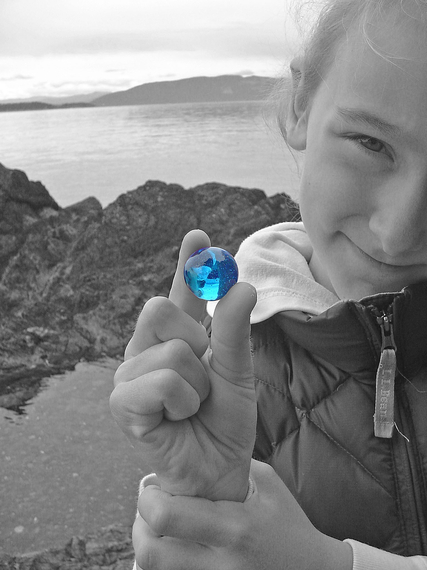Even with the vast expansion in exploration of the past few decades and the familiarity technology brings, I am still continually awed by the vastness of the world's oceans and the mysteries they hold. Oceans blanket 70 percent of the Earth's surface. We are intimately and cyclically connected to their ancient rhythms. The ocean calls to and inspires us in ways we can't easily explain -- but we try through poetry, art, and neuropsychology.
There is also an immense practical side to the world's oceans. The sea supports an incredibly abundant still-unfolding diversity of marine life, one of the hugest food sources for the planet, and it is a liquid highway for world commerce. It's no wonder that more than 400 leaders from government, science, corporations and conservation non-profits are meeting October 5 and 6 in Valparaiso, Chile, for the second "Our Ocean" conference. They are there because they know that if we neglect our oceans, the results could be catastrophic. For example, marine ecosystems that become irreparably damaged could lead to a diminished food supply for millions of hungry people worldwide. These leaders are all committed to protecting the ocean by supporting sustainable fisheries, and promoting initiatives and adopting plans that help reduce local, national and global levels of pollution.
At the first "Our Ocean" gathering last year, President Obama took the opportunity presented by the conference to announce a commitment to expand the Pacific Remote Islands Marine National Monument in the south-central Pacific Ocean, which contains some of the most pristine tropical marine environments in the world. The extended monument became the world's largest marine protected area, one of the last frontiers and havens for wildlife in the world, comprising the most widespread collection of coral reef, seabird, and shorebird protected areas on the planet under a single nation's jurisdiction.
We thank the administration for again taking a leadership position in speaking about and acting on the value of our oceans at this year's conference. In a video to attendees, President Obama announced that he has charged the National Oceanic and Atmospheric Administration with protecting two new sanctuaries, one in Maryland's waters in the Potomac River, and another in Wisconsin's Lake Michigan. He also promised increased efforts to halt illegal fisheries and to step up the protection of "even more of our waters in the months ahead."
A worthy follow-up to this great news would be ensuring that the New England Coral Canyons and Seamounts area, 150 miles off the coast of Cape Cod, is protected. These coral canyons plunge thousands of feet below the surface, some deeper than the Grand Canyon. The mountains (or "seamounts") reach 7,000 feet above the ocean floor. The area is a lush research ground for new and rare species and biologically diverse ecosystems. But it is fragile and vulnerable to the increased fishing, drilling, and mining operations in deeper waters and requires protection from such encroachments. Researchers are finding that more protection will have to be the norm for our oceans and the life they contain if they are to survive in the face of a variety of expanding human activities and the inevitable global changes ahead.
Right now New England's coral canyons and seamounts are healthy. They are home to magnificent underwater coral "forests" that, left undisturbed, grow to hundreds of years old and the size of small trees. The health of the canyons supports a larger regional ocean ecosystem and its blue economy. To ensure the wellbeing of this economic interdependence, the New England Coral Canyons and Seamounts will need permanent protection as a national monument.
By taking action to name this deep sea Atlantic treasure the first Marine National Monument in the U.S. Atlantic Ocean, the president will more than preserve a precious undersea world that holds new and important untold scientific discoveries. He will also prevent a part of the bond between us and the ocean from slipping away.
Beyond ecosystems, biodiversity, or economics, we have a creative and calming connection with the ocean that provides us with enormous emotional, psychological, social and spiritual benefits -- our Blue Mind. But really, it's more of an interdependence. Or as Dr. Sylvia Earle reminds us "the most important thing we take from the ocean is our existence."
The ocean will continue to nurture us, as it has for millennia, but only if we take care of it in return.
